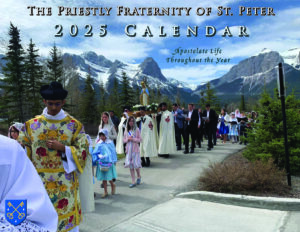Rogation Monday – St. Ambrose’s Lessons from the Roman Breviary
Today we begin the period of Rogationtide in the traditional Roman liturgy: three days of prayer and fasting before Ascension. During these days we ask God (Latin rogare) for protection from calamities, and for the success of the harvest being sown.
Sunday’s Gospel and Office focused on St. John’s passage (ch. 16) “ask and you shall receive”, and now they turn to a similar passage in St. Luke (11:5-13): “Ask, and it shall be given you: seek, and you shall find: knock, and it shall be opened to you.” St. Ambrose of Milan’s homily discussing this passage is featured in three lessons from the Office of Matins for Rogation Monday:
Homily by St Ambrose, Bishop of Milan. {Bk. vii. on Luke xi.)
We gather from this commandment, among other things, that we ought to pray, not only by day, but also by night. You see how he who arose at midnight to ask three loaves of his friend, and endured in supplication, was not disappointed of that which he sought. Of what are these three loaves a figure, but of that our Mysterious Bread which comes down from heaven? You see that if you love the Lord thy God, you may win His bounty, not only for yourself, but for others likewise. And who can deserve more to be called our “Friend” than He who gave His Own Body for us?
From this Friend it was that David asked bread at midnight, and received it, as he said: “At midnight I rise to give thanks unto Thee.” (Ps. cxviii. 62.) Even thus did he obtain those loaves [of spiritual nourishment] which he still sets before us for our refreshment. How he asked it, we know from him saying: “Every night I wash my bed.” (Ps. vi. 7.) He knew that there was no fear of waking Him Who sleeps not. (Ps. cxx. 3.) Therefore let us keep in mind the things which are written for our learning, and be instant in prayer both by day and by night, to ask pardon of our sins.
If David, who was such a Saint, and whose time was so taken up by the cares of a kingdom, praised the Lord seven times a day, (Ps. cxviii. 164,) and was always present with godly zeal at the morning and evening sacrifice, what ought we to do, (who have so much more need to pray, as the weakness of our body and mind so much more often makes us to fall,) that we — wearied with this pilgrimage, and worn out by the gradual waning of our earthly days, and the changes of life — may not be starved of that life-giving Bread that strengthens man’s heart? The Lord teaches us to be watchful, all of us, and not at midnight only, but always. “And if He shall come in the second watch, or come in the third watch, and find them so — blessed are those servants whom the Lord, when He cometh, shall find watching.” (Luke xii. 37.)
May 18, 2020








